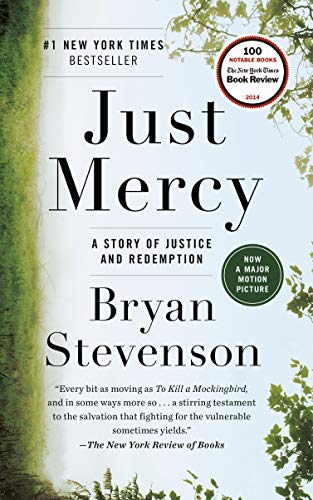
by Bryan Stevenson, 2014
Excellent book! I’m not sure where I heard about it but I’m so glad I read it. Bryan Stevenson is a lawyer who started the Equal Justice Initiative. We needed him and, unfortunately, we still do. He works tirelessly to free innocent men from death row, to end the death penalty for children, and for fair sentencing. The main story in this book is the story of Walter McMillian, who was an innocent, hard-working black man, who was wrongly accused of murdering a white woman in Monroeville, Alabama, by a corrupt white sheriff and detectives completely fabricated a story just to get a conviction and bribed people to lie in court, and sentenced him to death. He was on death row for 6 years. It took 6 years for Bryan to clear his name, even after the main witness swore in a new trial that everything he said in the first trial was a lie. Unbelievable how these southern white men can be so dishonest, despicable, hateful, racist, and feel no qualms about condemning a black man for a crime he didn’t commit.
All the racists need to die, and if they raised their children to be racist, they need to die also. But Bryan Stevenson is not an angry black man; he is so calm, so loving, so respectful, so hopeful, so humble. At the end of the book, he thanks those he helped: “I want to thank the hundreds of accused, convicted, and imprisoned men, women, and children with whom I have worked and who have taught me so much about hope, justice, and mercy.”
Loved this book and love this man. God bless him richly. He is doing God’s work in an extremely dark part of our world.
Besides Walter McMillian’s story, he also tells the story of Avery Jenkins, a mentally ill prisoner he helped who had been in abusive foster homes since the age of 2. When Bryan arrived at the prison, he noticed a pick-up truck covered in confederate stickers. The guard that admitted him was your typical white man, malevolent and racist. He made Bryan strip and be searched. He was rude and cruel. During the re-trial of Avery Jenkins, Bryan called a witnesses and doctors to describe the cruelty and abuse of his early life. The same guard was in the courtroom and heard all of this testimony. The next time Bryan went to visit Avery in the prison, this guard was there. He expected to be strip-searched again, but the guard put his hand on Bryan’s shoulder and said: “Man, I didn’t think anybody had it as bad as me. They moved me around like I wasn’t wanted nowhere. I had it pretty rough. But listening to what you was saying about Avery made me realize that there were other people who had it as bad as I did. I guess even worse…” The guard was a changed man – he even bought Avery the chocolate milkshake he wanted so badly.
Here are some quotes:
It was a common tactic used by Southern politicians during civil rights protests: Sue national media outlets for defamation if they provide sympathetic coverage of activists or if they characterize Southern politicians and law enforcement officers unfavorably. Southern state court judges and all-white juries were all too willing to rule in favor of “defamed” local officials, and state authorities had won millions of dollars in judgements this way. More important, the defamation lawsuits chilled sympathetic coverage of civil rights activism.
…In a landmark ruling, New York Times v. Sullivan changed the standard for defamation and libel by requiring plaintiffs to prove malice–that is, evidence of actual knowledge on the part of the publisher that a statement is false. The ruling marked a significant victory for freedom of the press, and it liberated media outlets and publishers to talk more honestly about civil rights protests and activism. But in the South it generated even more contempt for the national press, and that animosity has lingered beyond the Civil Rights Era…. (from page 209)
[This is what Bryan said when Walter was finally pronounced innocent, after 6 years on death row:]
“Your Honor, I just want to say this before we adjourn. It was far too easy to convict this wrongly accused man for murder and send him to death row for something he didn’t do and much too hard to win his freedom after proving his innocence. We have serious problems and important work that must be done in this state.”
He talks about prior cases, and one in particular, Randall Dale Adams, and an award-winning documentary called The Thin Blue Line. Need to see if the Library has that.
Here’s the almost last paragraph of the book, he’s just left the church after Walter’s funeral:
“Finally and most important, I told those gathered in the church that Walter had taught me that mercy is just when it is rooted in hopefulness and freely given. Mercy is most empowering, liberating, and transformative when it is directed at the undeserving. The people who haven’t earned it, who haven’t even sought it, are the most meaningful recipients of our compassion. Walter genuinely forgave the people who unfairly accused him, the people who convicted him, and the people who had judged him unworthy of mercy. And in the end, it was just mercy toward others that allowed him to recover a life worth celebrating, a life that rediscovered the love and freedom that all humans desire, a life that overcame death and condemnation until it was time to die on God’s schedule.”
What a beautiful book! Thank you, Bryan Stevenson, for your hard work, your faith, your love, your humbleness. You are a gift from God!